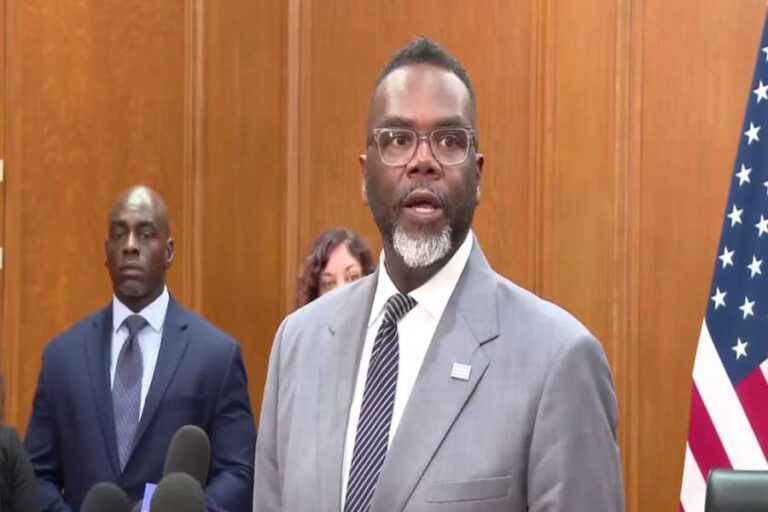Chicago Mayor Brandon Johnson has issued a stern warning about the city’s financial future, revealing a projected budget shortfall of $1.12 billion for Fiscal Year 2026. In an address delivered Monday, Johnson laid bare the seriousness of the situation, stating that Chicago is approaching a financial crossroads that demands swift, innovative, and difficult decisions. “Our city is truly at a crossroads right now,” he said. “Chicago is facing a projected budget gap of $1.12 billion in Fiscal Year ’26. We essentially need to do more with less.”
The revelation comes as city services already feel the pressure of post-pandemic economic recovery, inflation, and rising pension obligations. The $1.12 billion gap isn’t just a number—it represents a stark reality that could impact public safety, infrastructure, housing, education, and many of the critical services residents rely on daily. Mayor Johnson emphasized that this isn’t just a challenge to the city’s finances but a defining test of its leadership and priorities.
Taking immediate action, Johnson signed an executive order on Monday that creates a new financial working group charged with identifying practical solutions to stabilize the budget. This group will include an ambitious coalition of voices—business leaders, labor representatives, aldermen, and members of civic organizations. Together, they are being tasked with the critical mission of identifying waste, trimming inefficiencies, and uncovering new, sustainable revenue streams.
The timeline is tight. All members of this financial task force are expected to be named by April 30, with an initial report on potential budget reforms due by the end of August. The mayor said these efforts must be transparent, inclusive, and driven by real outcomes, not just political theater. “This isn’t just about cutting costs. It’s about making our government smarter, fairer, and more responsive to the people of Chicago,” Johnson explained.
While Johnson did not rule out possible tax increases, he stressed that the goal is to protect essential city services while finding creative, responsible ways to generate revenue. He also made clear that the working group will operate under the principle of shared responsibility, insisting that Chicago’s working families should not be unfairly burdened by any upcoming changes.
The announcement comes at a time when many large U.S. cities are grappling with the long-term effects of economic disruptions, including reduced federal aid, growing operating costs, and aging infrastructure. But Johnson’s message went beyond financial concern—it was a challenge to the city’s leadership and citizens alike. He called on Chicagoans to see this crisis not as an end, but as a beginning—a chance to restructure government in a way that’s more just, sustainable, and community-focused.
Some community leaders have welcomed the mayor’s inclusive approach. They believe a broader coalition is necessary to restore financial accountability and fairness in the budgeting process. Others, however, remain skeptical. Critics worry that yet another task force may delay action without producing real change. In response to those concerns, the mayor committed to making the working group’s recommendations public and promised ongoing community engagement throughout the process.
There is no doubt that the road ahead will be difficult. Budget deficits of this size rarely get solved without some pain. Whether that means rethinking city services, cutting administrative costs, or introducing new policies for economic growth, Chicago will have to confront some uncomfortable truths. But Johnson remains hopeful that with collaboration and urgency, the city can emerge from this stronger and more united.
“We are not the first city to face a billion-dollar deficit,” he said. “But we can be the first to overcome it with boldness and integrity. We can lead by example, not just in solving this crisis, but in showing how government can work for everyone.”
As the financial task force prepares to begin its work, the next several months will be pivotal. The decisions made today could shape the next decade of life in Chicago. From city services to employment to economic development, this budget crisis touches every corner of urban life.
Johnson’s message is clear: This is not a moment for panic, but for purpose. Chicago has a choice to make. And under his leadership, the city is choosing action over apathy, innovation over inertia.
For now, residents wait to see what recommendations will surface from the new working group and whether the city’s leaders will find the balance between fiscal responsibility and social equity. One thing is certain—Chicago’s budget battle is just beginning, and the outcome will impact every one of its nearly three million residents.
